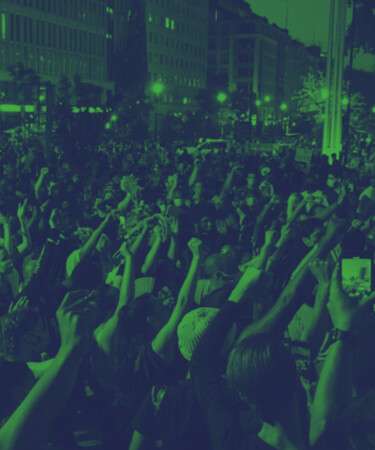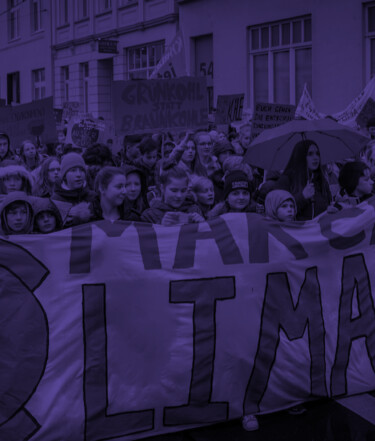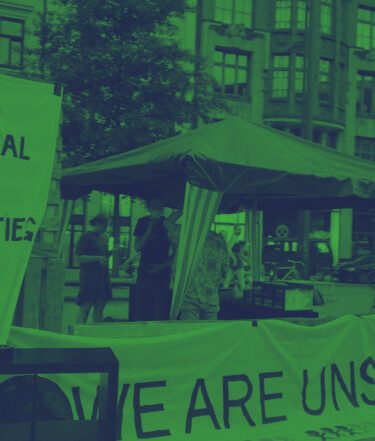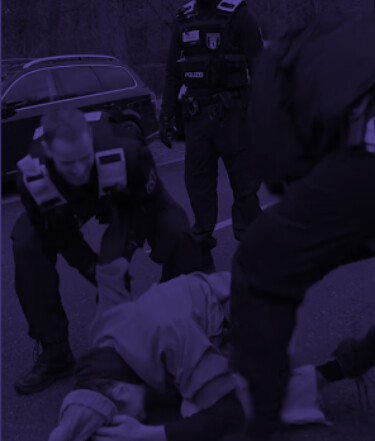
Protecting freedom of assembly: Language restrictions at protests are unconstitutional
If only German and English are permitted to be spoken at protests, fundamental rights are being massively violated. Foreign language speakers are deprived of the opportunity to participate. We stand up for diversity of opinion and against discrimination.
Public authorities can issue obligations for protests: These are rules that participants in an assembly must adhere to. Different authorities are responsible from state to state when someone registers a protest; in Berlin, it is the police. In February 2025, the Berlin police ordered an applicant for a pro-Palestinian demonstration to speak and shout slogans only in German and English. Such language restrictions are illegal - but there has not yet been a court ruling on the matter. We are therefore supporting the organizer of a pro-Palestinian demonstration in his lawsuit. The aim of the lawsuit is to achieve greater legal certainty in the context of freedom of assembly and freedom of expression. After all, these basic rights allow people to express themselves in their first language during demonstrations. This is an important prerequisite for participants to be able to take part in a demonstration at all.
Increase in language restrictions at pro-Palestinian demonstrations
The Berlin police justified the imposition of language restrictions in this case by stating that in the past, illegal anti-Semitic slogans have been chanted at pro-Palestinian demonstrations. Recognizing, preventing and prosecuting criminal acts is an important task of the police. However, the blanket ban on expressions in other languages interferes disproportionately with the participants' freedom of expression and freedom of assembly. In order to guarantee the fundamental rights of demonstrators and at the same time recognize illegal statements, the authorities can and must use language mediating officers or interpreters to translate foreign language statements.
The person who registered the demonstration in Berlin had filed a lawsuit against the police order with the Berlin Administrative Court before the rally in February: it must be possible for people to express their opinions in their native language at a rally. In summary proceedings, however, the court initially ruled that the language requirement was lawful. The ban therefore applied - and not all participants adhered to it. After a speech in Hebrew and shouts in Arabic, the police broke up the demonstration.
Very little case law on the prohibition of discrimination on the basis of language
The person registering the protest is now taking legal action against this with a so-called "Fortsetzungsfeststellungsklage" at the Berlin Administrative Court. The aim of the action is for the court to retrospectively determine that the language requirement was unlawful. We are supporting these ongoing proceedings in order to obtain a landmark decision. This is because there is hardly any case law to date on language requirements at assemblies and on the prohibition of discrimination on the basis of language.
A positive ruling would also strengthen our democracy: We aim for a clear statement that blanket bans on languages at protests are incompatible with a liberal democracy. A ruling would have a nationwide signal effect, so that assembly authorities and protesters from other federal states would also gain legal certainty. Language requirements discriminate against people because of their language and origin. We want to put a stop to this degrading administrative practice.
Language restrictions also at pro-Ukrainian protests
The language requirement at the pro-Palestinian protest is not an isolated case: the police issued a similar order at least once at a pro-Ukrainian demonstration in 2024. At that time, protesters were prohibited from making speeches or chanting in Ukrainian. While the law enforcement officers in that case admitted disproportionality in the immediate aftermath, this was not the case at the gathering in February 2025.




